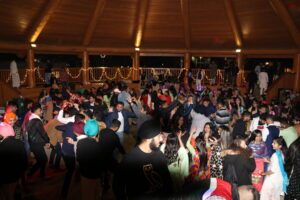The Camosun College Student Society (CCSS) will be throwing a big party for Diwali this year. Considered to be the most important festival in Indian culture, Diwali celebrates a triumphant moment in Hindu mythology when Rama and Sita were reunited and everyone in the kingdom illuminated the city to welcome the couple home.
CCSS external executive Prince Solanki is excited to share his culture with the Camosun community.
“That’s the thing about Diwali, that’s why we call it the Festival of Light, is because people light their whole houses,” says Solanki. “On the specific day, if you look at India’s map from the satellite view, you can literally see the whole [of] India—someone’s put a fire on the boundaries. It actually shines like that… That is Diwali.”
The CCSS will be hosting a party at Wicket Hall, located downtown in the Sticky Wicket, featuring live performances and a DJ on Friday, November 1, and they’ll also be encouraging students to bring their cultural pride with them to school.

“[Students] who follow Indian culture, they always bring those traditional clothes, one pair or two pairs of clothes in their suitcases,” says Solanki. “And for them, this could be an opportunity where they can wear those clothes. So yes, here we are asking students, if you want to wear your traditional clothes, yeah, go for it, wear it. Because we don’t have so many days to be in them.”
While Diwali is the next major holiday coming up, the CCSS makes a habit of sharing celebrations from all over the world. While much of the motivation is to make students from other cultures feel welcomed, it also serves to build understanding for students outside those traditions.
“For every culture, whenever we do such events, we want people to learn more about different cultures and not to feel offended when you first see them, maybe because they were brought up differently,” says Solanki.
Solanki feels strongly that students benefit from getting out of their comfort zones and participating in other ways of understanding—something Solanki pushes himself to do regularly.
“We just had a Korean festival in which we participated,” he says. “At first, I was a bit scared. It’s a different festival. How about if I don’t fit in? My first step was I just asked a friend, a friend who’s from here, I asked him, ‘Can you please take me?’ That way I have someone right next to me. Even if I was still scared… There are similarities in every culture”
Solanki has first-hand experience with bridging these gaps in understanding. Being outgoing, he has a lot of new friends he’s made in Canada, but they needed to take that extra step to feel they could connect with his other friends who were also from India.
“So I have some friends who are from here and they are so comfortable with me. They’re like, ‘Okay, dude, you… [have] different Indian friends, but you are different from them. It’s like the way you talk, the way you make me feel comfortable,’” he says. “But then I was like… let’s all go out sometime. We did. After that, we are all a group now. They were like, okay, yeah, you were right, actually. It’s just that maybe in the beginning, that person was shy, so he wasn’t able to see how my other friends are. I wasn’t shy, so that’s why it took a different route.”
Diwali is an opportunity for students to learn more about the world, and to take the initiative to broaden their horizons in the most fun way possible: at a party.
“I’m just excited to have Diwali to see how students will react,” says Solanki.
